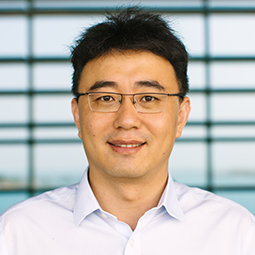
Huabin Zhang
Associate Professor, Chemistry
Physical Science and Engineering Division
“Seawater could become a key resource in the sustainable production of clean hydrogen fuel for acarbon neutral future.”
Program Affiliations
Biography
Professor Huabin Zhang joined KAUST in 2021 as an assistant professor of chemistry. His research centers on developing advanced catalysts at atomic level for both photo and electro catalysis, including water splitting and carbon dioxide reduction technology – investigations aimed at producing clean hydrogen fuel from seawater. Developed as part of the Energy Storage in Chemical Fuels and Electricity Regeneration group at KAUST, his work aligns with Saudi Arabia’s renewable energy strategy. Zhang’s research has been published in more than 130 journals, including Science Advances, Joule, Energy & Environmental Science, Journal of the American Chemical Society, Advanced Functional Materials and ACS Nano and Nano Energy. In 2024 he served as co-editor of a KAUST anniversary issue of Advanced Materials, a showcase of university research engaged in solving global challenges through scientific innovation and collaboration.
Research Interests
Dr. Zhang studies single-atom catalysts with particular configurations that enable sustainable energy conversion (i.e., photocatalysis, electrocatalysis, and thermal catalysis). His research extends to the challenges and opportunities involved with “operando investigation,” or real-time monitoring of the structural evolution of reactive centers, as well as the mutual interactions between a reactive center and reactant within the catalytic process. Together with a team of KAUST researchers, Dr. Zhang spearheaded the development of high-efficiency, stable hydrogen evolution electrocatalysts for seawater splitting, which has promising applications for the production of clean hydrogen fuels.
Education Profile
Postdoctoral Researcher, National Institute of Materials Science in Tsukuba, Japan, 2014
Ph.D., Chemistry, University of Chinese Academy of Science, Beijing, China, 2013
Awards and Recognitions
Publications
Research Areas
- Chemical Science

